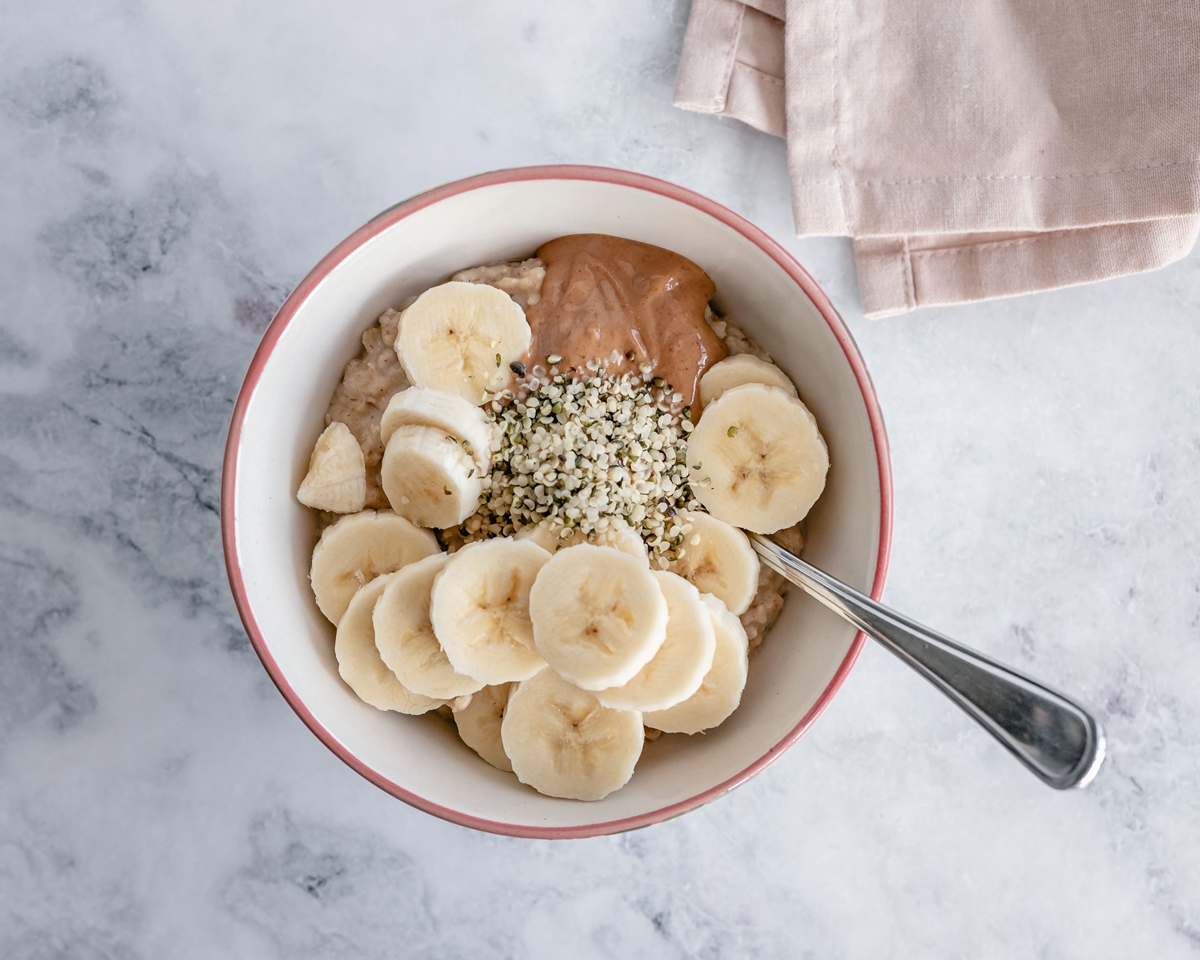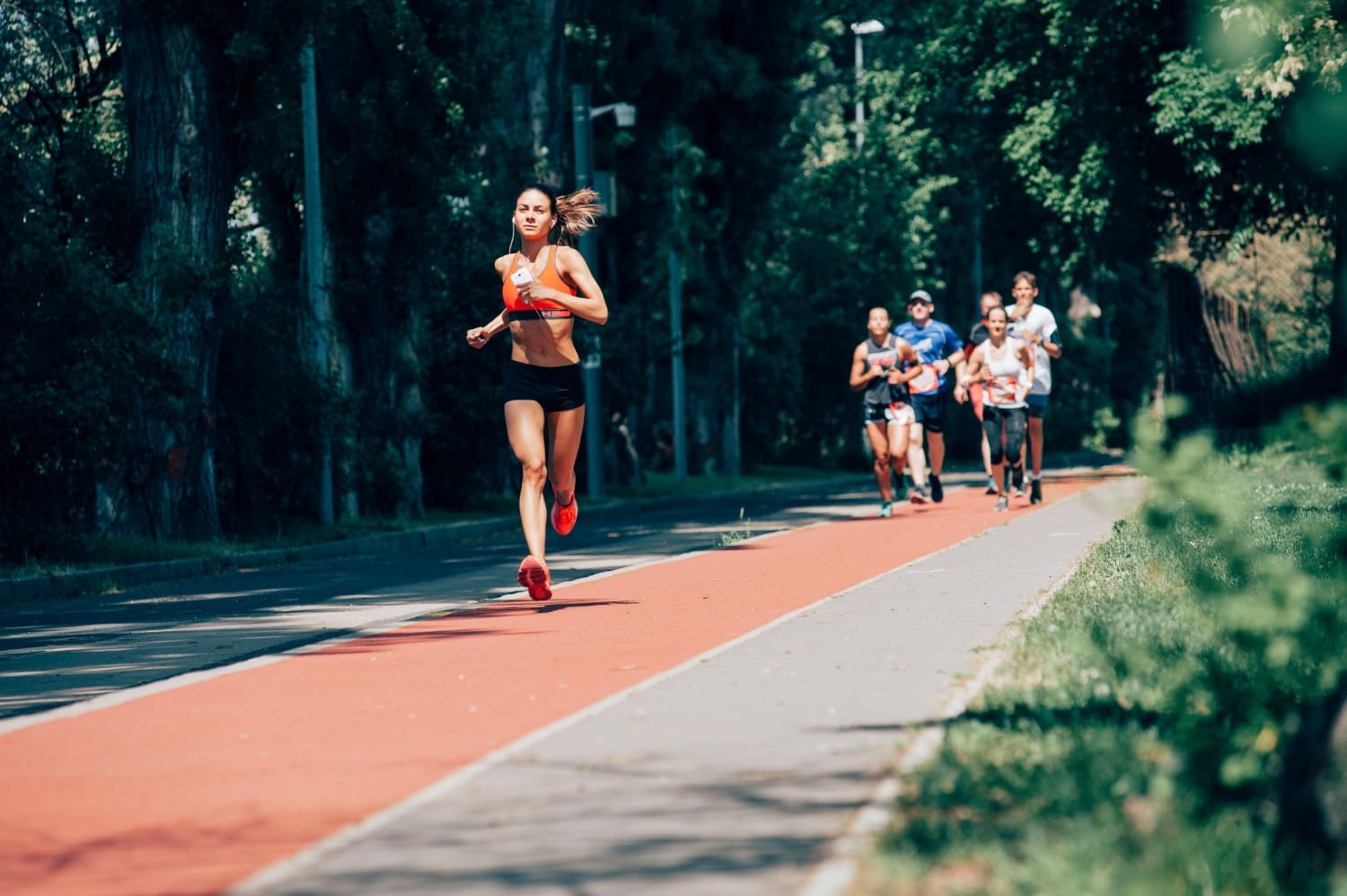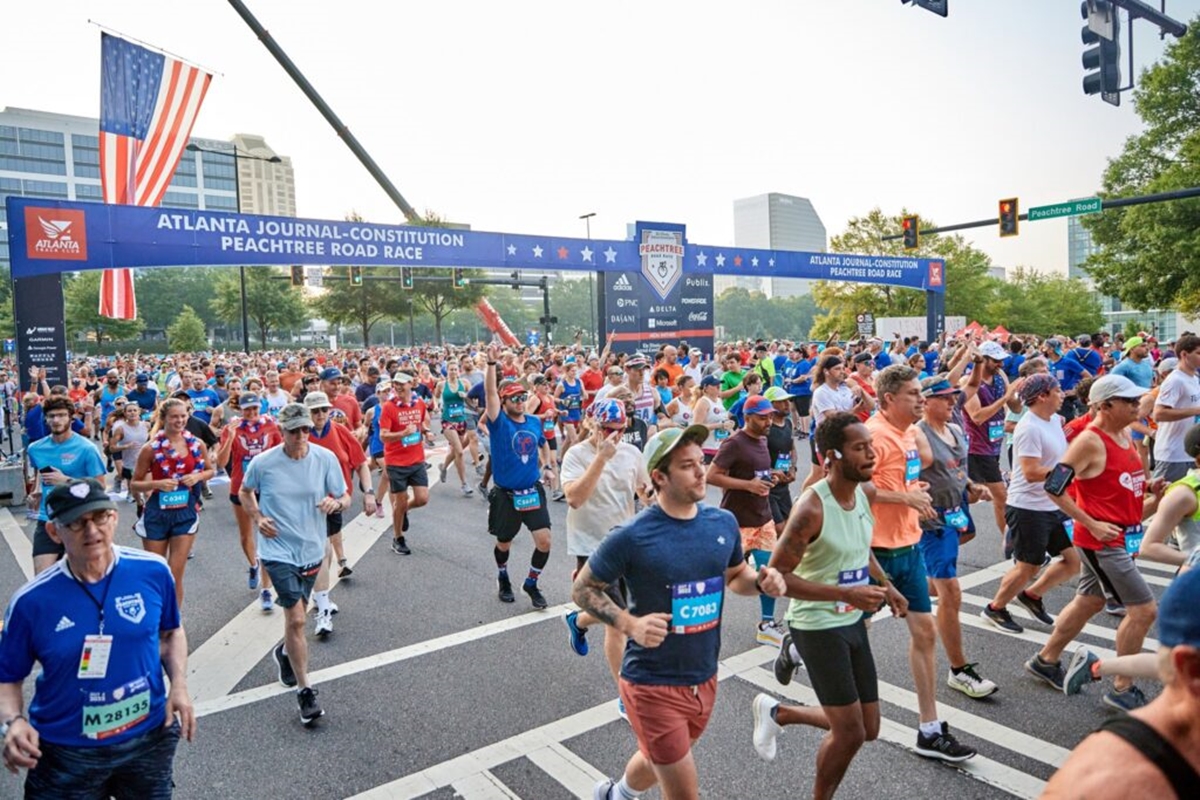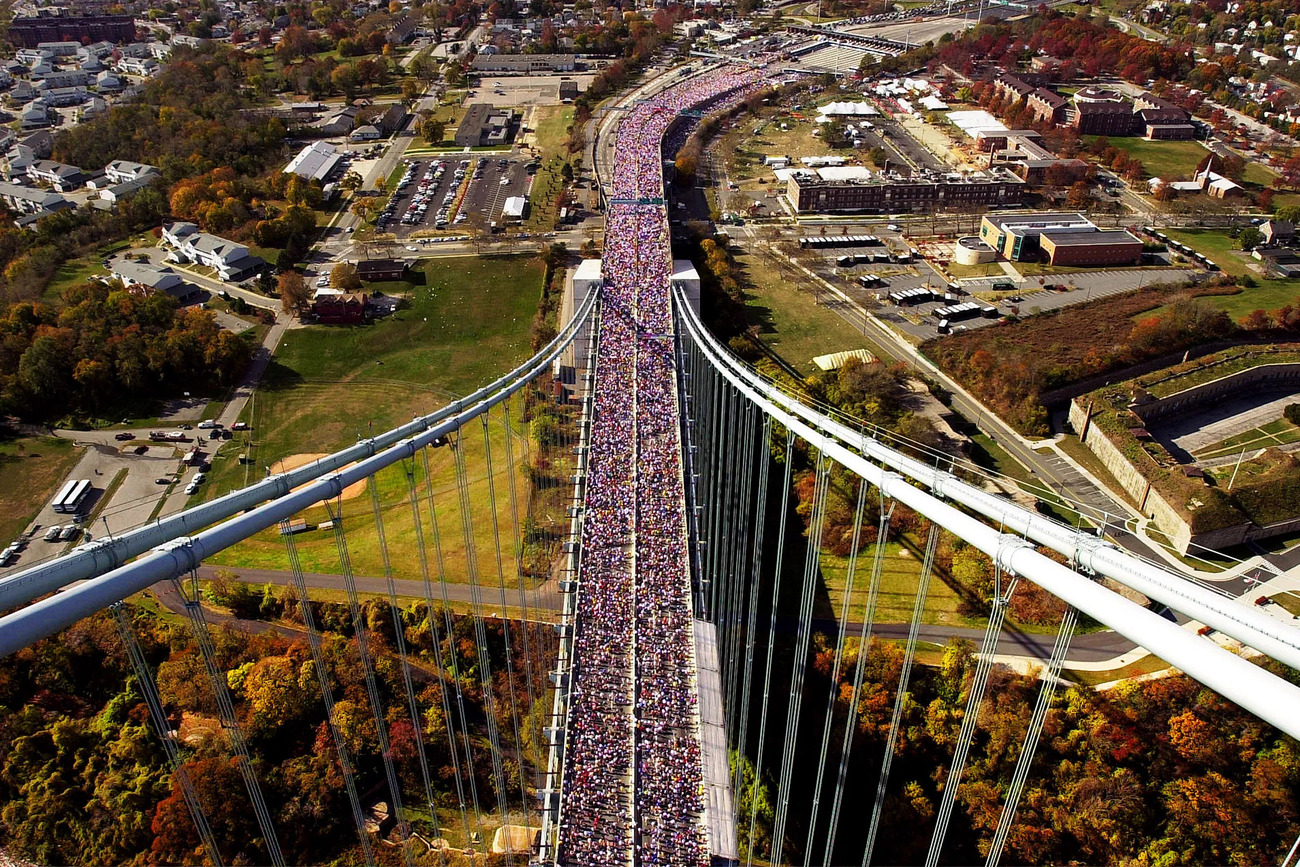

Featured
What Should I Eat Before 10K Run
Modified: January 2, 2024
Looking to fuel your 10K run? Discover the best pre-race meals and snacks in this featured guide, helping you optimize your performance.
Introduction
Preparing for a 10K run requires more than just physical training; it also involves careful attention to your nutrition. What you eat before a race can significantly impact your performance and overall experience. By fueling your body with the right nutrients, you can optimize your energy levels, promote muscle recovery, and enhance your endurance.
Proper nutrition before a 10K run is essential for several reasons. Firstly, it ensures that your body has enough fuel to sustain you throughout the race. Secondly, it helps to reduce the risk of muscle fatigue and cramping during the run. Finally, consuming the right balance of nutrients can enhance your overall performance and speed.
The key to an effective pre-run meal lies in incorporating the right combination of carbohydrates, protein, fats, and fluids. Carbohydrates serve as the primary source of fuel for your muscles and should make up the bulk of your pre-run meal. Protein aids in muscle repair and maintenance, while fats provide sustained energy. Hydration is also crucial to prepare your body for the demanding physical activity ahead.
Timing your pre-run meal is equally important. Eating too close to the race can lead to discomfort, while eating too early could leave you feeling hungry and low on energy. Finding the right balance will ensure that you have enough fuel to power through the run without any digestive issues.
In this article, we will explore the importance of proper nutrition before a 10K run and discuss the key nutrients that you should include in your pre-run meal. We will also provide some pre-run meal ideas to help you fuel up for your race. So, let’s dive in and discover how you can optimize your nutrition before a 10K run for peak performance.
Importance of Proper Nutrition Before a 10K Run
Proper nutrition plays a crucial role in preparing your body for a 10K run. The food you consume before the race provides the energy and nutrients needed to perform at your best. Here are some key reasons why proper nutrition before a 10K run is essential:
- Fuel for Endurance: A 10K run is a challenging endurance event that requires sustained energy. Your body primarily relies on carbohydrates for fuel during exercise. Consuming a carbohydrate-rich meal before the race helps to top up your glycogen stores, which are the primary fuel source for muscles. This ensures that you have adequate energy to power through the entire race.
- Muscle Recovery and Maintenance: Running a 10K puts significant stress on your muscles. Consuming protein before the race helps to support muscle recovery and maintenance. Protein provides the necessary amino acids to rebuild and repair muscle fibers, reducing the risk of muscle damage and enhancing overall performance.
- Sustained Energy: Including healthy fats in your pre-run meal can provide a steady source of energy. While carbohydrates provide quick energy, fats take longer to digest and can sustain your energy levels throughout the race. Opt for sources of healthy fats such as avocados, nuts, and seeds.
- Electrolyte Balance: Sweating during a 10K race leads to fluid and electrolyte loss. Hydrating adequately before the run, as well as consuming foods rich in electrolytes such as bananas and coconut water, helps to maintain electrolyte balance. This is crucial for preventing muscle cramps and dehydration during the race.
Taking care of your nutrition before a 10K run not only enhances your physical performance but also helps to mitigate the risk of discomfort and fatigue during the race. Failing to provide your body with the right nutrients can result in decreased energy levels, muscle fatigue, and even gastrointestinal issues. It is important to prioritize proper nutrition to optimize your performance and ensure a smooth and enjoyable running experience.
Key Nutrients to Include in Pre-Run Meal
When it comes to preparing for a 10K run, the composition of your pre-run meal is crucial. Here are the key nutrients that you should include to fuel your body for optimal performance:
- Carbohydrates: Carbohydrates are the primary source of fuel for your muscles during exercise. Consuming complex carbohydrates, such as whole grains, fruits, and vegetables, provides a slow and steady release of energy. Aim to include a mix of carbohydrates in your pre-run meal to ensure sustained energy throughout the race.
- Protein: Protein plays a vital role in muscle recovery and maintenance. Including lean sources of protein, such as chicken, fish, tofu, or beans, helps to repair muscle fibers and prevent muscle breakdown during the run. Aim for a moderate amount of protein in your pre-run meal to support optimal performance.
- Fats: While carbohydrates are the primary fuel source, incorporating healthy fats into your pre-run meal can ensure a steady and prolonged energy release. Focus on sources of unsaturated fats, such as avocados, nuts, and olive oil, to provide sustained fuel for longer runs.
- Hydration: Proper hydration is essential for optimal performance and overall well-being during a 10K run. Aim to drink water throughout the day leading up to the race and consider consuming hydrating foods like watermelon or cucumbers. Avoid excessive caffeine and alcohol, as they can dehydrate your body.
Finding the right balance of these nutrients is key. Your pre-run meal should be easily digestible, provide sustained energy, and not cause any discomfort during the race. Experiment with different food combinations during your training runs to determine what works best for you.
Remember, nutrition is not a one-size-fits-all approach, and what works for one person may not work for another. Listen to your body and make adjustments to your pre-run meal based on your individual needs and preferences.
Carbohydrates: The Fuel for Your Run
Carbohydrates play a crucial role in fueling your body for a 10K run. They provide the energy your muscles need to perform optimally during the race. Consuming the right type and amount of carbohydrates before the run can significantly impact your performance and endurance. Here’s why carbohydrates are the fuel for your run:
- Source of Quick Energy: Carbohydrates are converted into glucose, which is the primary fuel source for your muscles. When you consume carbohydrates before a run, your body breaks them down into glucose, which is stored as glycogen in your muscles and liver. During exercise, your body taps into these glycogen stores to provide quick energy, allowing you to maintain a steady pace and complete the race.
- Prevents Muscle Fatigue: Running a 10K requires sustained effort from your muscles. Without an adequate supply of carbohydrates, your body may resort to breaking down muscle protein for energy, leading to muscle fatigue and reduced performance. By consuming carbohydrates before the run, you provide your muscles with readily available fuel, preserving muscle glycogen stores and preventing muscle breakdown.
- Enhances Endurance: Endurance events like a 10K rely heavily on the body’s glycogen stores. By consuming carbohydrates before the run, you can increase the amount of glycogen stored in your muscles, which can extend your endurance. This means you’ll be able to maintain a higher intensity for a longer period, helping you to reach the finish line faster and with less fatigue.
- Optimal Carbohydrate Choices: When selecting carbohydrates for your pre-run meal, focus on complex carbohydrates that provide sustained energy. Foods like whole grains, fruits, vegetables, and legumes are excellent choices. These carbohydrates are digested slowly, releasing a steady stream of glucose into your bloodstream, providing you with a sustained and consistent source of energy during the race.
Finding the right balance of carbohydrates for your pre-run meal is essential. Aim to consume a meal that provides a mix of both fast-acting and slow-release carbohydrates for immediate and sustained energy. Experiment with different carbohydrate sources during your training to discover what works best for your body and provides optimal fuel for your run.
Remember to time your carbohydrate intake appropriately, allowing enough time for digestion before the race start. This may vary from person to person, but a general guideline is to consume a carbohydrate-rich meal around 2-3 hours before the run to ensure proper digestion and absorption of the carbohydrates.
Protein: For Muscle Recovery and Maintenance
Protein plays a crucial role in preparing your muscles for a 10K run. It is essential for muscle recovery, maintenance, and overall performance. Including an adequate amount of protein in your pre-run meal can help optimize your running experience. Here’s why protein is important for muscle recovery and maintenance:
- Muscle Repair: Running a 10K puts a significant amount of stress on your muscles. Consuming protein before the run provides the necessary amino acids needed for muscle repair and recovery. These amino acids help to rebuild and strengthen muscle fibers, reducing the risk of muscle damage and improving overall performance.
- Muscle Maintenance: Protein is also essential for maintaining lean muscle mass. During long-distance running, your body may breakdown muscle protein for energy if there is insufficient carbohydrate and fat availability. Including protein in your pre-run meal can help provide a readily available source of amino acids, preventing muscle breakdown and preserving your hard-earned muscle mass.
- Aids in Nutrient Delivery: Protein plays a role in facilitating the delivery of nutrients and oxygen to your muscles. By consuming protein before the race, you promote proper blood flow to your muscles, ensuring they receive the necessary nutrients and oxygen for optimal performance.
- Optimal Protein Choices: When choosing protein sources for your pre-run meal, opt for lean sources such as chicken, turkey, fish, tofu, or legumes. These options are low in fat and provide high-quality protein. Including a moderate amount of protein in your meal will give your body the necessary amino acids without weighing you down or causing digestive discomfort during the run.
It’s important to note that protein alone cannot provide you with the energy needed to sustain a 10K run. The primary source of fuel for exercise comes from carbohydrates. However, including protein in your pre-run meal can support muscle recovery, reduce muscle damage, and enhance overall performance.
Timing is crucial when consuming protein before a run. Aim to include protein in your meal about 2-3 hours before the race to allow for proper digestion. This timing strikes a balance between providing your body with the necessary amino acids for muscle recovery and allowing sufficient time for digestion to prevent any gastrointestinal discomfort during the run.
Fats: Providing Sustained Energy
While carbohydrates are the primary source of fuel for your 10K run, incorporating healthy fats into your pre-run meal can provide sustained energy and support your overall performance. Fats are a valuable fuel source, especially for longer runs. Here’s why fats are important and how they can contribute to your running performance:
- Sustained Energy Release: Unlike carbohydrates, which provide quick energy, fats are a more concentrated source of energy. They are digested slower, providing a sustained release of energy over a longer period. By including healthy fats in your pre-run meal, you can ensure a steady supply of fuel to power you through the entire race.
- Improved Endurance: Running a 10K requires endurance, and fats can help enhance your endurance capacity. By tapping into fat as an energy source, your body can preserve its glycogen stores for more intense bursts of activity. This allows you to maintain a steady pace for a longer period, ultimately improving your endurance during the race.
- Satiety and Nutrient Absorption: Fats contribute to a feeling of satiety, keeping you satisfied and preventing hunger during the race. Additionally, certain vitamins and minerals are fat-soluble, meaning they require fat for proper absorption. Including healthy fats in your pre-run meal can aid in the absorption of these essential nutrients.
- Optimal Fat Choices: When selecting fats for your pre-run meal, focus on incorporating healthy sources such as avocados, nuts, seeds, and olive oil. These foods provide monounsaturated and polyunsaturated fats, which are beneficial for heart health and overall well-being. Avoid consuming excess amounts of saturated and trans fats, as they can contribute to sluggishness and digestive discomfort during the run.
While including fats in your pre-run meal can be beneficial, it’s important to strike a balance. Consuming too much fat may lead to gastrointestinal discomfort or slow digestion. Aim to include a moderate amount of healthy fats alongside carbohydrates and protein to optimize your energy levels and enhance your performance during the 10K run.
Remember that fat-rich foods can take longer to digest, so it’s recommended to consume your pre-run meal containing fats at least 2-3 hours before the race. This timing allows sufficient time for digestion and ensures that you have sustained energy throughout the run.
Hydration: Preparing Your Body for the Run
Proper hydration is vital for optimal performance and overall well-being during a 10K run. Preparing your body for the race by hydrating adequately can help prevent muscle cramps, maintain electrolyte balance, and sustain your energy levels. Here’s why hydration is crucial and how you can ensure you’re properly hydrated before your run:
- Replace Fluid Loss: Running a 10K causes your body to sweat and lose fluid. It’s essential to replace this lost fluid before the race to prevent dehydration. Adequate hydration helps maintain blood volume, ensuring that your muscles receive enough oxygen and nutrients for optimal performance.
- Maintain Electrolyte Balance: Alongside fluid loss, running also leads to a loss of electrolytes, such as sodium, potassium, and magnesium, through sweat. These electrolytes play a crucial role in muscle function and hydration balance. Consuming foods and drinks rich in electrolytes, like bananas or coconut water, before the race can help restore and maintain electrolyte levels and prevent muscle cramps.
- Prevent Fatigue: Dehydration can significantly impact your energy levels and overall performance. When your body is dehydrated, it has to work harder to maintain your exercise intensity, leading to increased fatigue. By staying properly hydrated before the race, you can ensure your body has the necessary fluids to function optimally and keep fatigue at bay.
- Hydration Tips: Start hydrating well before the race. Drink water throughout the day leading up to the run to ensure you’re adequately hydrated. Aim to consume at least 8-16 ounces (240-480 ml) of water within 2-3 hours before the race. Avoid excessive caffeine and alcohol, as they can dehydrate your body. Instead, focus on water, electrolyte-rich drinks, or diluted fruit juices for proper hydration.
Remember that individual hydration needs may vary based on various factors like climate, duration of the run, and personal sweat rate. It’s important to listen to your body and hydrate accordingly. If you’re unsure about your hydration needs, consult with a sports nutritionist or healthcare professional for personalized guidance.
Prioritizing hydration before a 10K run is essential for peak performance and overall well-being. By ensuring that you’re properly hydrated, you can set yourself up for success and enjoy a more comfortable and enjoyable race experience.
Timing Your Pre-Run Meal
Timing your pre-run meal is just as important as the composition of the meal itself. Eating too close to the race start can lead to discomfort and digestive issues, while eating too early may leave you feeling hungry and low on energy. Finding the right timing ensures that you have enough fuel to power through the run without any digestive discomfort. Here are some key considerations for timing your pre-run meal:
- Allow Sufficient Digestion Time: Aim to eat your pre-run meal approximately 2-3 hours before the race. This timeframe allows your body enough time to digest and absorb the nutrients from the meal, ensuring that you have energy readily available during the race. Eating too close to the race start may result in cramping or a heavy feeling in your stomach.
- Avoid the Feeling of Hunger: Eating too early before the race may leave you feeling hungry, which can negatively impact your energy levels and performance. Finding the right balance ensures that you have consumed enough food to satisfy your hunger but allows for proper digestion before the race.
- Test and Adjust: It’s essential to experiment during your training runs to determine what timing works best for you. Every runner’s body is different, and the optimal timing for your pre-run meal may vary. Pay attention to how your body feels during your training runs when consuming meals at different time intervals, and adjust accordingly.
- Snack Option: If you prefer to eat something lighter or have less time before the race, you can opt for a small snack around 30-60 minutes before the run. Choose easily digestible carbohydrates, such as a banana or an energy bar, to provide some quick energy without weighing you down.
Remember to hydrate consistently leading up to the race, regardless of the timing of your pre-run meal. Consuming a balanced meal that includes carbohydrates, protein, and fats approximately 2-3 hours before the run, and allowing sufficient time for digestion, will help optimize your energy levels and enhance your running performance.
Ultimately, finding the right timing for your pre-run meal is a personal preference and may require some trial and error. Listen to your body, pay attention to how different timing affects your performance, and make adjustments accordingly to ensure you feel fueled and comfortable during your 10K run.
Pre-Run Meal Ideas
Fueling your body with the right nutrients before a 10K run is essential for optimal performance. Here are some pre-run meal ideas that incorporate the necessary carbohydrates, protein, fats, and hydration to provide you with the energy you need to complete the race:
- Banana and Nut Butter Toast: Spread a tablespoon of your favorite nut butter on whole grain toast and top it with sliced banana. This combination offers carbohydrates, healthy fats, and a touch of protein. It’s easily digestible and provides sustained energy.
- Oatmeal with Berries and Nuts: Cook a serving of oatmeal with water or milk and top it with a handful of fresh berries and a sprinkle of nuts or seeds. Oats provide carbohydrates, while berries offer antioxidants, and nuts or seeds add healthy fats and protein.
- Yogurt Parfait: Layer Greek yogurt with mixed berries, a drizzle of honey, and a sprinkle of granola or nuts. Greek yogurt is packed with protein while the berries provide carbohydrates and antioxidants. The honey adds natural sweetness, and the granola or nuts add a crunchy texture and healthy fats.
- Quinoa Salad with Grilled Chicken: Cook quinoa and toss it with mixed vegetables, such as cucumbers, bell peppers, and cherry tomatoes. Add grilled chicken for a lean protein source. Drizzle with a light vinaigrette made with olive oil and lemon juice for some healthy fats.
- Burrito Bowl: Create a bowl with brown rice, black beans, grilled chicken or tofu, and a variety of colorful veggies like bell peppers, corn, and tomatoes. Top it off with salsa, a squeeze of lime, and a dollop of Greek yogurt. This meal provides a good balance of carbs, protein, and fiber.
- Smoothie with Spinach and Protein Powder: Blend together a combination of spinach, frozen berries, a scoop of protein powder, and a liquid base like almond milk or coconut water. This refreshing smoothie offers carbohydrates, protein, and hydration, making it an easy and quick pre-run option.
Remember to hydrate well before your 10K run, drinking water or electrolyte-rich beverages leading up to the race. Adjust the portion sizes of these meals based on your individual needs and preferences, and consider any dietary restrictions or food allergies you may have.
Experiment with these pre-run meal ideas during your training runs to determine what works best for your body and enhances your running performance. Find the meal that leaves you feeling energized, comfortable, and ready to conquer the race.
Conclusion
Proper nutrition before a 10K run is essential for optimizing your performance, enhancing your endurance, and supporting your overall well-being. By fueling your body with the right nutrients, you can ensure that you have sustained energy throughout the race and reduce the risk of muscle fatigue and discomfort.
Key nutrients to include in your pre-run meal are carbohydrates, protein, fats, and hydration. Carbohydrates provide the fuel your muscles need for endurance, while protein supports muscle recovery and maintenance. Fats offer sustained energy, and proper hydration ensures you stay hydrated and maintain electrolyte balance.
Timing your pre-run meal is crucial to allow for proper digestion and prevent any gastrointestinal discomfort during the race. Aim to consume your meal 2-3 hours before the race to ensure you have enough fuel without feeling hungry or weighed down.
When it comes to pre-run meal ideas, there are plenty of options to choose from. Whether it’s a banana and nut butter toast, a yogurt parfait, or a burrito bowl, focus on incorporating a mix of carbohydrates, protein, and healthy fats to provide sustained energy and support muscle recovery.
Remember that everyone’s nutritional needs and preferences are unique, so it’s important to experiment and find what works best for your body. Listen to your body, pay attention to how different foods and timing affect your energy levels, and make adjustments accordingly.
By prioritizing proper nutrition and hydration before your 10K run, you can optimize your performance, reduce the risk of fatigue and discomfort, and enjoy a more enjoyable and successful race experience. So fuel up, hydrate well, and get ready to conquer the 10K with energy and confidence!





